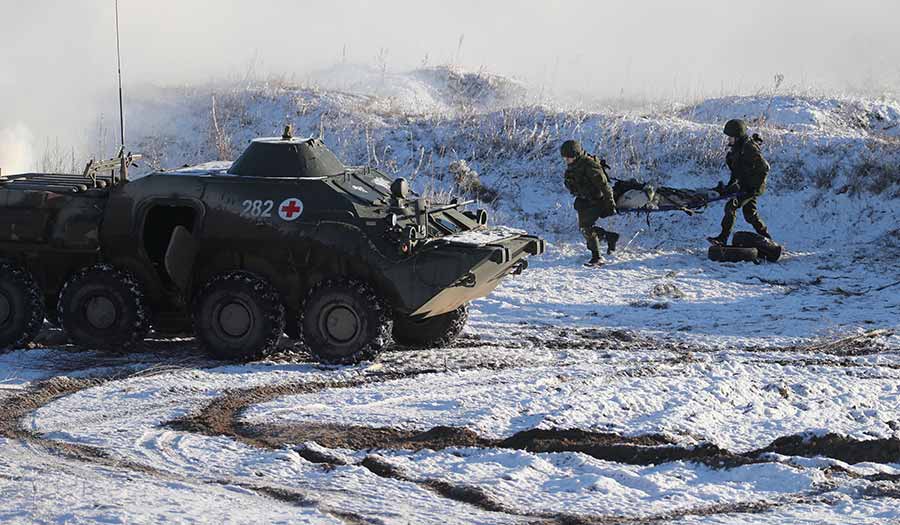 Leonid Scheglov/BelTA/Handout via Reuters
Leonid Scheglov/BelTA/Handout via Reuters
World News Desk
Learn the why behind the headlines.
Subscribe to the Real Truth for FREE news and analysis.
Subscribe NowWashington/Kiev (Reuters) – Russia could invade Ukraine at any time and might create a surprise pretext for an attack, the United States said on Sunday, as it reaffirmed a pledge to defend “every inch” of NATO territory.
Russia has more than 100,000 troops massed near Ukraine, which is not part of the Atlantic military alliance, and Washington—while keeping open the diplomatic channels that have so far failed to ease the crisis—has repeatedly said an invasion is imminent.
Moscow denies any such plans and has accused the West of “hysteria.”
German Chancellor Olaf Scholz, on the eve of a trip that takes him to Kiev on Monday and Moscow for talks with President Vladimir Putin on Tuesday, called for Russia to de-escalate and warned of sanctions if Moscow did invade.
A German official said Berlin did not expect “concrete results” but diplomacy was important.
In what could amount to a major concession to Moscow, Ukraine’s ambassador to Britain told BBC Kiev could drop its bid to join NATO to avoid war.
Ambassador Vadym Prystaiko was quoted as saying Ukraine was willing to be “flexible” over its goal to join the Atlantic military alliance.
“We might—especially being threatened like that, blackmailed by that, and pushed to it,” Mr. Prystaiko was quoted as saying when asked if Kiev could change its position on NATO membership.
In Washington, President Joe Biden’s National Security Adviser Jake Sullivan said an invasion could begin “any day now.”
“We cannot perfectly predict the day, but we have now been saying for some time that we are in the window,” Mr. Sullivan told CNN.
U.S. officials said they could not confirm reports that U.S. intelligence indicated Russia planned to invade on Wednesday.
Mr. Sullivan said Washington would continue sharing what it learned with the world in order to deny Moscow the chance to stage a surprise “false flag” operation that could be a pretext for an attack.
It would also “defend every inch of NATO territory…and Russia we think fully understands that message,” Sullivan added in a separate CBS interview.
Mr. Biden spoke to his Ukrainian counterpart Volodymyr Zelenskiy on Sunday and they agreed on the importance of continuing to pursue diplomacy and deterrence in response to Russia’s military build-up, the White House said after the call.
Mr. Zelenskiy’s office said he invited Mr. Biden to visit Ukraine soon. The White House declined to comment.
Agreeing with the U.S. assessment that an invasion could happen “at any moment,” a British government spokesperson said Britain was working on a package of military support and economic aid for Ukraine to be announced in coming days. Prime Minister Boris Johnson will make a trip to Europe later this week to build support to end the standoff with Russia.
Mr. Biden told Mr. Putin in a phone call on Saturday that the West would respond decisively to any invasion and such an attack would harm and isolate Moscow.
Russian Security Demands
The Kremlin said Mr. Putin told Mr. Biden during their call on Saturday that Washington had failed to take Russia’s main concerns into account, and that it had received no “substantial answer” on key elements of its security demands.
Mr. Putin wants guarantees from the United States and NATO that include blocking Ukraine’s entry into NATO, refraining from missile deployments near Russia’s borders and scaling back NATO’s military infrastructure in Europe to 1997 levels.
Washington regards many of the proposals as non-starters but has pushed the Kremlin to discuss them jointly with Washington and its European allies.
“The diplomatic path remains open. The way for Moscow to show that it wants to pursue that path is simple,” U.S. Secretary of State Anthony Blinken said after he held talks on Saturday with Asian allies.
British defense minister Ben Wallace cautioned against putting too much hope in talks, telling The Sunday Times of London that there was “a whiff of Munich in the air from some in the West”, referring to a 1938 pact that failed to halt German expansionism under Adolf Hitler.
More on Related Topics:
- Ukraine’s Surprise Cross-border Incursion Seen as a Tactical Reply to Russia’s Grinding Gains
- F-16s Have Arrived to Help Ukraine Fight Russia. What Is Their Possible Impact?
- Ukraine Starts EU Membership Talks in Midst of War
- Russia Broadens Tactical Nuclear Weapons Drills
- Berlin Lets Ukraine Use German Weapons Against Targets in Russia After the U.S. Also Eases Stance


